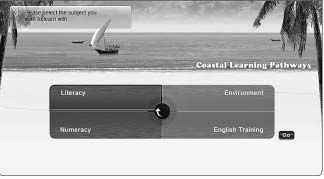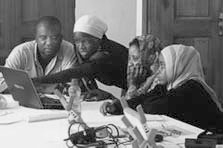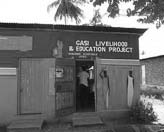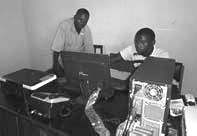Ignatz Heinz
Fish stocks are being depleted as the result of growing population densities and the destructive impact of climate change on natural coral reefs. For Kenya’s coastal population, the loss of their main traditional food and livelihood base has created a critical need for alternative forms of work and new sources of income. People must be trained accordingly. Using an integral approach, CORDIO and Avallain are collaborating to link ICTs with traditional African techniques such as storytelling.
eLearning for Healthy Communities and Coral Reefs
Origins
CORDIO East Africa – an organization focusing on education of coastal communities as part of their overall mission to preserve marine environments – and Avallain have been working together since finding common interests at the e-learning Africa conference in Ghana in 2008. CORDIO was seeking ways to efficiently create interactive literacy and environmental content for community training sessions. Avallain was interested in finding new applications for the “100$ Laptop” and on using the “Avallain Author”, a system capable of creating interactive eLearning content for diverse subject matters starting from basic literacy. The particular strength of the “Avallain Author” is an education-focused concept. Trainers and content experts with basic computer know-how and no programming skills are enabled to create interactive content, “learning activities”, in sensible modular packages focusing on the learner’s needs and the didactical approach rather than the technology. From a learner perspective, the resulting learning material is engaging and easily accessible, even for users with a low affinity to formal learning. This has been proven in usability studies in various settings around the world.
CORDIO
Coastal Oceans Research and Development in the Indian Ocean (CORDIO) was initiated in 1999 as a direct response to the El-Niño related mass bleaching and mortality of corals in the Indian Ocean in 1998, focusing initially on Eastern Africa, Western Indian Ocean Islands and South Asia. Since the Indian Ocean tsunami in 2004 the programme also covers the Andaman Sea, and from 2007 has started work in the Red Sea.
Donors and supporters of CORDIO include the Swedish International Development Cooperation Agency, the World Bank, the Swedish Program for ICT in Developing Regions (SPIDER) and the World Wildlife Fund (WWF) while partnerships cover mostly scientific research collaboration efforts with entities such as the Cambridge Coastal Research Unit, the Academia Sinica in Taiwan, Google Ocean, the Great Barrier Reef Marine Park Authority and many more.
Today, CORDIO’s goals for the next decade include research, assessment, a better integration of science, practice and policy. Ultimately, CORDIO endeavours to educate and build the capacity of coastal people to improve their livelihoods and long term well-being. These objectives are shared by Avallain, so that the two organisations developed a partnership based on common interests.
The challenges faced by developing countries in the 2010s dwarf those of previous decades as the footprint of the world’s population exceeds the size of the planet. Global climate change is one of the most pressing illustrations of this, signaled clearly by degrading coral reefs.
The challenges facing the marine environment can be summarized in three broad areas:
Biophysical challenges (habitat fragmentation, loss of species and reduced productivity),
Social challenges (overpopulation and high consumption, poverty, lack of alternatives, low awareness and poor governance) and
Contextual drivers (low technical capacity, synergistic problems, globalization and perverse economic and political incentives).
Again, education can play an obvious role in alleviating the social challenges, and in this aspect a collaboration with Avallain suited CORDIO.
Avallain
Avallain, founded in 2002 and headquartered in Switzerland, describes itself as a social enterprise offering tools and services for educational publishing in the increasingly digitised 21 st century. Experts in eLearning and ePublishing, Avallain aims at using ICT in Education to achieve a maximum positive impact on human development. The goal is to assure that the Internet is a tool for inclusion rather than an accelerating agent of the digital divide.

The main menu of the Coastal Learning Pathways eLearning suite
Source: Ignatz Heinz
Avallain’s staff, an international team of experts, drawing on experience from 15 years of high profile projects in learning and internet technology for clients, works with a small group of high-impact customers and partners.
Typical projects include language and curriculum based learning platforms such as “Career Express” and “Studienstarter” for Cornelsen Verlag, as well as the “Ich will schreiben lernen” System for the German Adult Education Association (Deutscher Volkshochschul-Verband). In both cases, customized learning platforms provide large amounts of interactive self-learning and tutor-guided content to individuals that learn at home, in schools, or in tertiary education facilities.
Operating Non Profit Literacy systems in four countries, investing in local capacity in Kenya, and partnering with the One Laptop per Child Initiative and Google Africa, Avallain develops innovative solutions and processes that benefit traditional publishing customers, while, together with its partners, providing free efficient education to those who need it most.
Since 2009, Avallain has a sister company in Nairobi, Kenya, and is building local capacity for projects focused on the same educational goals in an African context.
The Target Audience
An ideal opportunity for collaboration presented itself with a training series that CORDIO was preparing for coastal communities on the south coast (this is the Kenyan coast south of Mombasa). In villages around Diani and Tiwi Beach, CORDIO planned to conduct ICT (similar to the ECDL – European Computers Drivers License) trainings for fishermen and fisher-women, in the context of opening varied sources of income (e.g. jobs in the tourism industry) in the face of declining fish populations and therefore fishing yields.
 Impressions from the preliminary workshop
Impressions from the preliminary workshop
Source: Ignatz Heinz
As the pure ICT training often seemed remote to the actual needs and living conditions or the audience, the collaboration between CORDIO and Avallain focused on providing e-learning content on relevant subjects and turning the ICT-training aspect into an “accidental” side-effect rather than the core purpose of the training sessions.
 The trainings were held on location in the communities (see image) by CORDIO field workers who facilitated and guided the usage of the e-learning equipped computers.
The trainings were held on location in the communities (see image) by CORDIO field workers who facilitated and guided the usage of the e-learning equipped computers.
Rationale
Performing isolated ICT training, such as general PC use or “Windows” training for audiences in rural settings and with little or no basic literacy capacity, is always problematic. Motivating the learners to learn instruments that are so extremely unrelated to their daily life and activities is hard, and the efficiency is questionable, as at least 80 % of the content will remain irrelevant even when the learners adopt more ICT use subsequently.
An integrated approach, where the ICT skills come more or less accidentally through the fact that the training on some other subject matter is conducted with ICT tools, often makes more sense. This is a widely acknowledged fact in literature and in practice.
Consequently, the focus was set on literacy and numeracy, environmental and English language training (which is very relevant for coastal people to get a chance for a job in the tourism sector) – the biggest needs for the communities concerned.
Creating the Content
The actual content was then prepared by Avallain’s team in Kenya and in Switzerland, with original input of the base content by CORDIO, the Ministry of Education, and from generic sources. The didactic approach was story telling, adopting a traditional training technique of the communities. Locally researched examples from the daily needs in Kenya were used as the building blocks for the stories and tasks. Instead of just learning chapter by chapter, each chapter, e.g. about filling in forms, starts with a context story: Saumu; Khadijas older sister works as a cleaner in Furaha beach hotel and is learning a lot from her friends...wants to use Mpesa (a well known service of the local telecoms to send money via mobile phones). She thinks this would be a good service to pay for fish purchase for her mother..... The learners are now guiding Saumu step by step through the registration process. They are practicing to fill in forms with basic information and help Saumu to get registered and use Mpesa. In order to be as close to practical use as possible, real paper forms from the Telecoms are used for training.
In collaboration with local researchers, Avallain also made use of a unique Swahili text-to-speech system which allowed for full audio support without the (in this project) prohibitive cost and time requirements of studio recording. The Kenyans love audio – and it was very motivating to listen to the context story while the text was displayed on the screen sentence by sentence.

Computer room,
Source: Ignatz Heinz
Executing the trainings
Initially, three day joint workshops in Diani were held to assess the group’s response to the new tools and content. After this, regular trainings were conducted using the equipment and interactive content. The participants enjoyed the completely new way of learning and the friendly equipment (among the interesting and unexpected results was the preference for the laptops because they allow a traditional sitting group rather than the imported class-room structure with PC posts known from other trainings).
Outlook
The field workers reported particularly positive results in terms of participants’ motivation and consistent quality of the material in contrast to previous experience with copied and manually compiled sources. Based on the success, CORDIO is looking to expand the project and content production using the “Avallain Author” at the next possible occasion.
Further Information
http://www.cordioea.org/
http://avallain.blogspot.com/search?q=cordio
www.avallain.com



